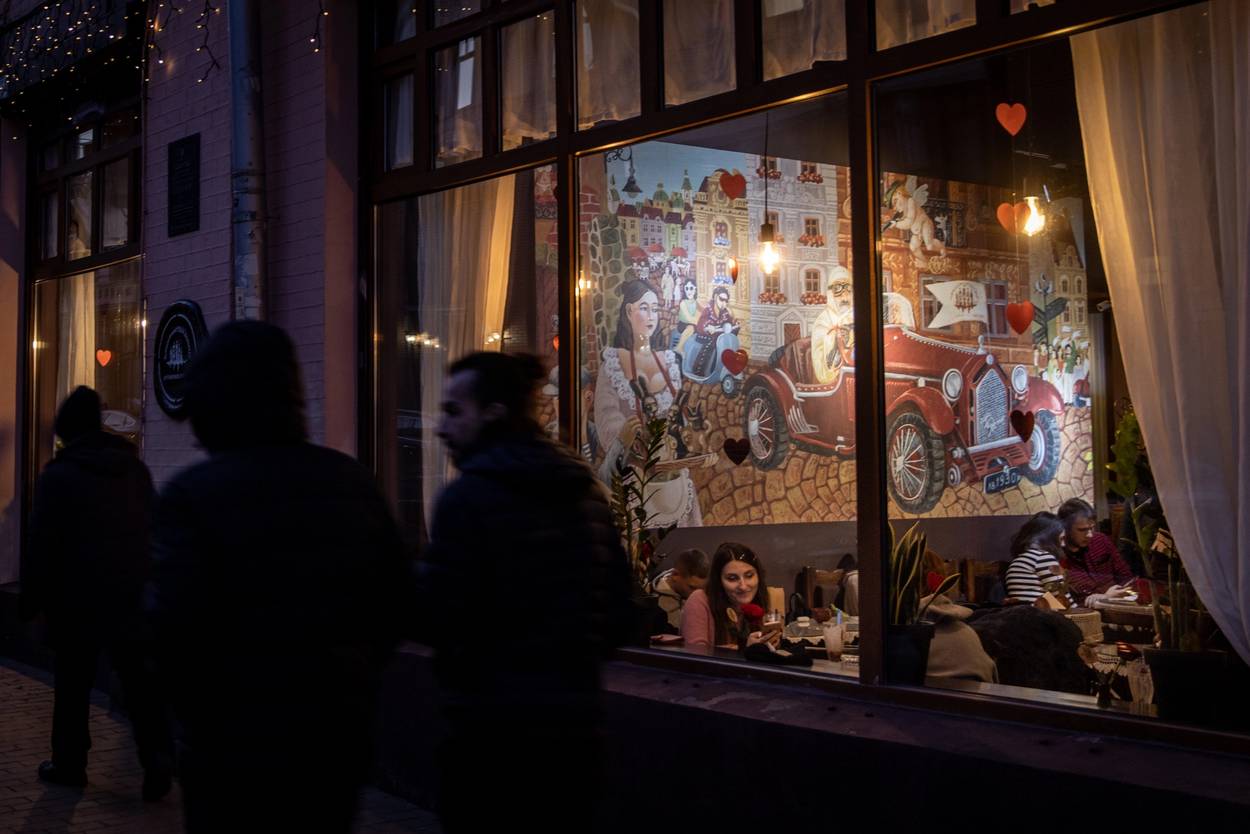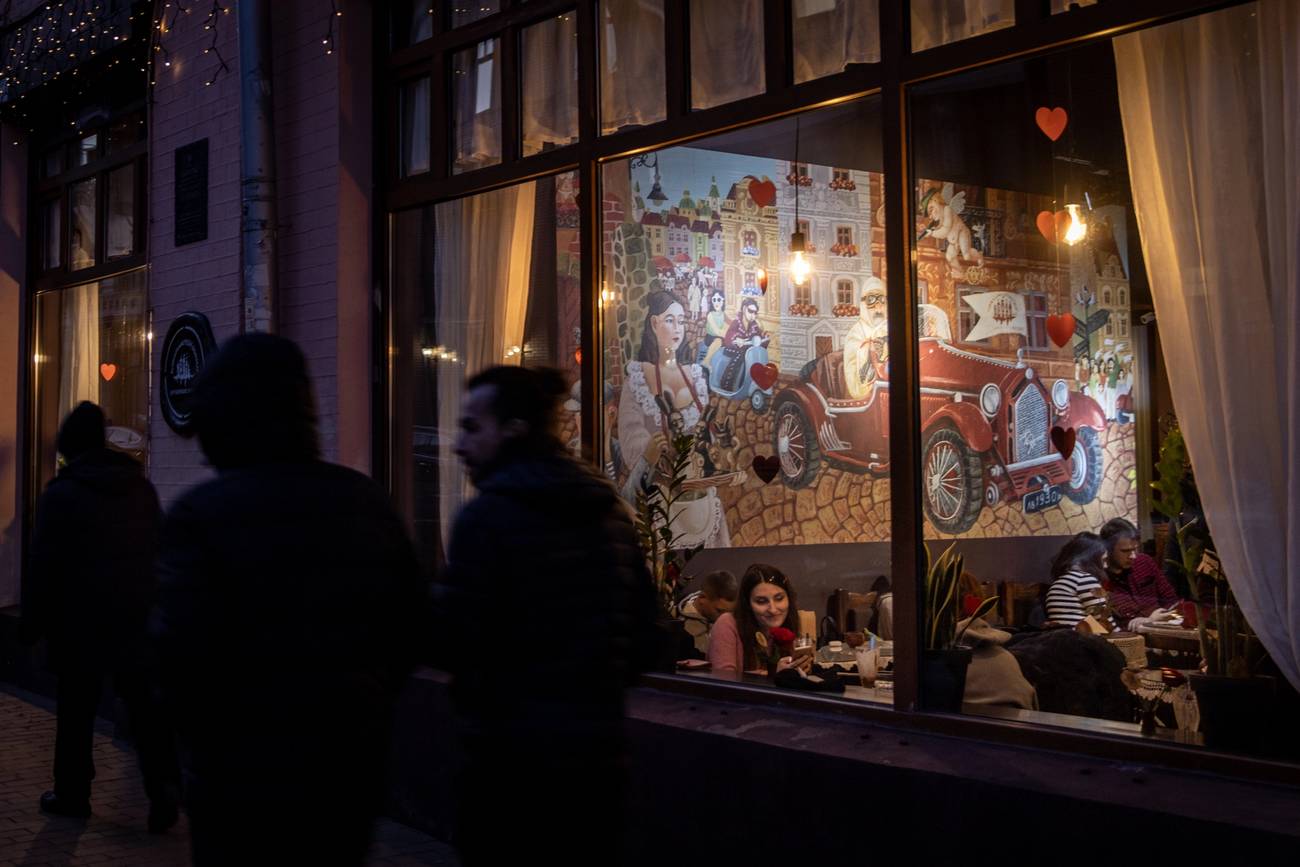My Last 24 Hours in Kyiv
The pleasurable hours leading up to the first explosions already belong to a past life that Ukrainians will not know again for a long time




The 24 hours leading up to Vladimir Putin’s invasion were disquieting in their combination of surrealism and tedium. The population of Kyiv was clearly deeply anxious, either engaging in seemingly over-the-top preparations for war (every cable news network reported on some little babushka learning to shoot an automatic rifle) or else ignoring it completely. Ukrainians in the capital were oblivious and stoic in the effortlessly graceful manner of men and women who have authentically embraced fatalism.
Along with my fellow Ukraine hand Nolan Peterson—a tall, avuncular, strapping, former combat pilot who is a real life version of Captain America— I wound up spending the eve of the war with the American actor Sean Penn over whiskey, vodka, and cigarettes. Penn was in good form and told us a story about meeting a young President Putin along with Jack Nicholson in a dacha near Moscow. I can confirm that hanging out with Sean Penn was also the last thing Ukrainian President Volodymyr Zelensky did before the invasion began.
My memory of that night, before war advanced ever farther into Europe, is of an utterly bored international press corps continuing to imbibe copious amounts of spirits in Kyiv’s finest dining establishments, waiting for something to happen.
For my own part, camped out in the Hyatt Hotel, I wrote in the mornings, and spent time in the banya in the afternoon. I would run on the treadmill in the basement gym and watch BBC live feeds being shot on the floor above me. Nikolay Karabinovych, my friend from Odessa and the creator of the conceptual art movement Neue Judische Kunst, called me as I was trying to sweat out the toxins from the drinking bout of the previous evening. Everyone at the time was discussing the existence of supposed “kill lists” that the Russian army was ordered to carry out against dissidents and civil society types.
Karabinovych wanted to know if I knew anything about these lists—a European diplomat had called him to say that his embassy suspected he might be on them. Given my affiliations with the Atlantic Council and Tablet, had I heard if I was also on the kill list?
“Now that you mention it,” I replied. “Probably.”
For his part, Karabinovych was delighted to learn that the head of security at my suburban safe house, which a wealthy acquaintance had let me use in the event of a Russian incursion, was a Jew (and a former army officer).
“Wow, I didn’t even know they made Jewish bodyguards!” he marveled. “I always knew you were a star, but a Jewish bodyguard!”
I reminded him that the Ukrainian defense minister until late last year was a gent from Lviv with the oh-so Jewish surname of Reznikov.
Eight hours before the first missiles would be launched, and the first Russian battle tanks would cross the swampy frontier between Ukraine and Belarus, I met another friend, a Jewish political consultant, for a quick coffee. The affable and easy-going gentleman is from the occupied city of Donetsk. He had become an internally displaced person in 2014, when his home town was taken over by Russian-led separatist forces. The evening was giving him the same wretched, unheimlich feeling that he had also felt right before Igor Girkin, a Russian FSB officer who enjoys dressing up as a Russian Civil War general, had initiated the war in Eastern Ukraine.
“I have a gut feeling that Russia will actually launch a new hot war in Ukraine,” he said. “I have decided to move my kids away from Kyiv, to take them to Western Ukraine before coming back to Kyiv. I have no other place to flee. In my family we have three generations, one after another, that had to flee, because of the war. It started with my grandparents who had to leave during the Holocaust and continued with my parents fleeing the Russian occupation of Donetsk in 2014. And now I am still running with my kids. I never expected that I would have such experiences. And yet I do.”
He then told me the story of his two grandmothers, one Russian and the other Jewish, who had both refused to leave their apartments in Donetsk. He is less concerned about his Jewish grandmother, however, who at 94 years old has serious hearing issues.
“Not hearing the explosions from the shelling next to the city center and the airport is good,” he told me with an amused smile. “Being deaf, she remains calm!”
The other grandmother spends her days watching Russian propaganda television and also reading the Ukrainian news on the iPad that he had taught her to use in her late 70s.
I finished off that fateful evening at dinner with my fantastically eccentric and hilariously profane Ukrainian American banker friend. The high-end Italian restaurant we dined at was packed with well-dressed Ukrainian elites. I had the octopus and rice pilaf. He had a bowl of linguini. The waiter informed us that in the previous weeks the restaurant had seen business slightly increase. The war had not started yet, and my companion was reminiscing about the many love affairs he had as a young banker in 1990s Moscow, though I am still skeptical of his story about Britney Spears and a small bag of coke. By the end of the dinner I had begun to receive texts and phone calls, some from friends who would have the information to speak with authority, instructing me to leave Kyiv.
These messages became more and more insistent. As our taxis arrived in the parking lot, my friend and I exchanged escape plans and embraced.
Sadly, grotesquely, the pleasures of civilized life in Kyiv have now been sundered by the paranoid fantasies and hatreds of a single man. It seems obviously clear that spending time in the banya, making weirdo Yiddish art, and reminiscing on past love affairs belong to a quality of life that Kyiv will not enjoy again for a very long time.
Vladislav Davidzon is Tablet’s European culture correspondent and a Ukrainian-American writer, translator, and critic. He is the Chief Editor of The Odessa Review and a Non-Resident Fellow at the Atlantic Council. He was born in Tashkent, Uzbekistan, and lives in Paris.